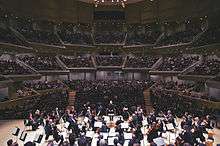Toronto Symphony Orchestra
| Toronto Symphony Orchestra (TSO) | |
|---|---|
| Orchestra | |
 Music Director Peter Oundjian posing with the Toronto Symphony Orchestra in Roy Thomson Hall before a concert on January 18, 2012. | |
| Former name | New Symphony Orchestra |
| Founded | 1922 |
| Principal conductor | Peter Oundjian |
| Website |
www |

The Toronto Symphony Orchestra (TSO) is a Canadian orchestra based in Toronto, Ontario. Founded in 1922, the TSO gave regular concerts at Massey Hall until 1982, and since then has performed at Roy Thomson Hall. The TSO also manages the Toronto Symphony Youth Orchestra (TSYO).
As of 2015, the music director of the TSO was Peter Oundjian, and its conductor laureate is Andrew Davis.
History
The TSO was founded in 1922 as the New Symphony Orchestra, and gave its first concert at Massey Hall in April 1923 with 58 musicians. The first conductor was Luigi von Kunits, and that season there were twenty concerts, as well as a performance at a spring festival.[1]
In the summer of 1924, the symphony performed at the Canadian National Exhibition. Shortly thereafter, the TSO began holding children's concerts.[1] The orchestra changed its name to the Toronto Symphony Orchestra in 1927. In 1929, the TSO made its radio debut with a one-hour broadcast on CBC Radio from the Arcadian Court of Simpson's department store.[1]
After von Kunits' death in 1931, the orchestra was led by conductor and composer Ernest MacMillan.[1]

The orchestra had made headlines for its hiring practices in 1951, when it declined to renew the contracts of musicians, thereafter known as the Symphony Six who had been denied entry to the United States on suspicion of communist activities (this was during the McCarthy Era).
Andrew Davis was the TSO's music director from 1975 to 1988, and in 2015 remains the orchestra's conductor laureate.[2]
The orchestra had financial and audience size problems in the 1990s, and in 1992 TSO musicians had accepted a 16% pay cut because of a threat of bankruptcy to the orchestra, with a promise from management to make up the loss in subsequent contract negotiations. By 1999, this pay restoration had not happened, which led to an 11-week musicians' strike that autumn.[3] Relations between the musicians and management deteriorated, and the music director at the time, Jukka-Pekka Saraste, offered to serve as mediator in the situation. In addition, there was a lack of public sympathy to the orchestra musicians' situation.[4]

By 2001, the orchestra had debt of $7 million (Canadian), and both of its former executive directors, Ed Smith and Saraste, had left the ensemble.[5]
Peter Oundjian was appointed as music director in January 2003 and became music director with the 2004–2005 season.[6] The 2005 documentary film Five Days in September: The Rebirth of an Orchestra (Canada, 2005) recorded the first days of the TSO's inaugural season with Oundjian as its new music director.[7]
By the 2006–2007 season, the subscriber base had increased to about 25,000, and the audience average capacity also increased to 84%.[8] In November 2008, the orchestra reported its third consecutive year of budget surpluses, with average audience attendance of 88% (excluding concerts for schoolchildren), although the orchestra still retains overall debt of $8.9 million (Canadian).[9]
In April 2015 the TSO cancelled performance of Valentina Lisitsa, a world famous pianist born in Ukraine. It accused her of Public incitement of hatred [10] and asked her to remain silent about the scandal.[11] Lisitsa had publicly criticized the current regime in Kiev for, among other things, having Nazi leanings. (See Svoboda_(political_party), Azov_Battalion).
The TSO is governed by a board of 25 directors. In 2015, the board is chaired by Christopher Hodgson.[12]
Music directors
|
|
Concertmasters
The post of concertmaster vacated by Jacques Israelievitch in 2008 was filled in 2011 by Canadian violinist Jonathan Crow.
|
|
References
- 1 2 3 4 Vyhnak, Carola. "Birth of the Toronto Symphony Orchestra". Toronto Star, 14 June 2015, page A12.
- ↑ William Littler for the Toronto Star. May 8, 2015. The TSO’s Englishman in Toronto
- ↑ "Toronto Symphony negotiations hit sour note". CBC News. 25 September 1999. Retrieved 2008-11-08.
- ↑ Warren, Richard, It Begins With The Oboe. University of Toronto Press (Toronto, 2002; ISBN 978-0-8020-3588-2), pp. 209–211.
- ↑ Tamara Bernstein (25 October 2001). "Toronto Symphony Teeters on the Edge of Ruin". andante.com (overall site now defunct). Archived from the original on November 17, 2002. Retrieved 2008-11-02.
- ↑ John Terauds (8 February 2007). "Conductor puts mark on TSO through '12". Toronto Star. Retrieved 2008-11-02.
- ↑ Jason Buchanan for the New York Times. Review: Five Days in September: The Rebirth of an Orchestra (2005) Page accessed July 7, 2015
- ↑ John Terauds (3 February 2007). "TSO's new season". Toronto Star. Retrieved 2008-11-02.
- ↑ John Terauds (20 November 2008). "TSO salutes its third surplus in row". Toronto Star. Retrieved 2008-11-21.
- ↑ title=section 319(2) of the Criminal Code of Canada http://yourlaws.ca/criminal-code-canada/319-public-incitement-hatred title=section 319(2) of the Criminal Code of Canada Check
|url=|title=(help) - ↑ "Music and Politics: The Toronto Symphony Orchestra Silences Ukrainian Musician Valentina Lisitsa". 8 April 2015. Retrieved 2015-04-08.
- ↑ "Toronto Symphony Orchestra: About the TSO". Retrieved 2013-05-01.
External links
| ||||||
|